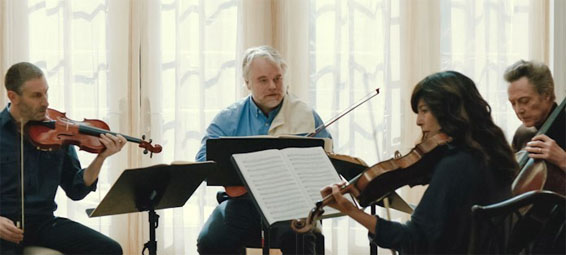Yaron Zilberman’s A Late Quartet opens with a quote from the beginning of T.S. Eliot’s Four Quartets. “Time present and time past / Are both perhaps present in time future, / And time future contained in time past. / If all time is eternally present / All time is unredeemable.” The lines, read by the cellist Peter Mitchell (Christopher Walken) to his students at a music conservatory in New York, ring like a riddle. Peter tells the students that the poet’s favorite piece of music was Beethoven’s “Opus 131 String Quartet in C-sharp minor,” a piece of music which places strict time demands on the musicians playing the music. And as Beethoven’s composition becomes a touchstone in A Late Quartet, playing underneath much of the action that follows, offering a kind of structure to this winter story about the last days of Peter’s accomplished quartet, it is Eliot’s lines that really pin the drama to Zilberman’s thematic concerns. A Late Quartet is a film about reconciling pasts and futures, dealing with that which time renders unredeemable. And like Eliot’s poem, the movie is, in part, a meditation on the would-have-beens and the other possible lives that haunt these characters in their autumn years.
Peter’s ensemble is aptly named The Fugue Quartet; the film itself possesses something of a melodic repetition throughout. The group includes the first violinist Daniel Lerner (Mark Ivanir), second violinist Robert Gelbart (Philip Seymour Hoffman), and violist Juliette Gelbart (Catherine Keener). Like any long-lasting artistic collaboration, after twenty-five years of playing and touring the world together, there is both a familial-like cohesion that binds the group and a complex intertwining of relationships that causes friction (we are reminded of Five Easy Pieces). Robert is married to Juliette. Juliette is Peter’s step child. And Daniel may or may not be in love with Juliette. There are other tensions. Robert has been playing second fiddle (literally) to the perfectionist Daniel for two-and-a-half decades, and he wants the group to loosen up and Daniel to trade time in the first chair. And the Gelbart’s daughter, Alexandra (Imogen Poots), begins taking violin lessons with Daniel and falls in love with him. But the primary conflict is provided by Peter’s age and slow debilitation. Practicing before The Fugue Quartet’s upcoming twenty-fifth anniversary season, Peter, the group’s senior member, discovers he has Parkinson’s disease and must quit the group after a final performance.
What follows is a complex interweaving of parts, each of the four characters working to find their place within in the context of the group and within their own lives. Deep-seated animosities are dragged to the surface. Robert comes to blows with Daniel, as Robert’s own affair with a flamenco dancer sparks a rift with his wife Juliette. Even Alexandra’s internalized resentment over having a mother who toured relentlessly throughout her childhood comes bubbling to the surface with stark viciousness. And yet we never get the sense that Zilberman is setting up conflict in order to resolve it – to get the band back together, as they say. Rather these various conflicts — rooted in regret and remorse, desire and dreams – are portrayed as preceisely the stuff that makes life life, and what fuels the authenticity and validity of the music. “Shame on you,” Peter scolds Daniel when he tries to quit the quartet after an argument over his romantic foibles. The fault here, as Peter sees it, has to do with Daniel’s infidelity not to his fellow performers, but to the music. We are reminded of Eliot’s meditation on the relationship between the permanence of art and the flux of time – the eternity that is perceived through art. “Can words or music reach / The stillness, as a Chinese jar still / Moves perpetually in its stillness,” Eliot writes. Daniel needs to get his priorities straight.
Given the names on the marquee, it is no surprise that A Late Quartet is marvelously acted. To work, it is has to be. Like the Beethoven piece, Zilberman’s film is a tricky thing to pace, each of its array of subplots working only when they slide seamless into the other plots. You can also make an analogy between each actor and their instrument. As Daniel and Robert tangle, it is Peter who offers the story bedrock, Walken’s oft-parodied cadence emerging as more sage-like as the story develops. Likewise the structure of Zilberman’s movie is deceivingly unconventional. Its most impactful and meaningful moments come not from a swell of dramatic momentum, but rather in passing melodies, whether they be a barbed line of dialogue or a pained flash of expression on Hoffman’s delightful and ever-virtuosic face.
This style of filmmaking can also make A Late Quartet feel vague or too loose in parts. And by the end of the film, there is something ever so slightly mangled about its mixture of tone and momentum. The final scene, as the four musicians gather on stage to play their final performance after twenty-five years, feels like it is yearning for a weight, perhaps a solemnity, that isn’t quite there. It is frustrating because the scene itself is so potent, these four individuals, soul-wrecked by their restless, competing desires lost for a final time in the suspended animation of their music. When, after much prodding by Robert, the perfectionist Daniel finally agrees to close his score and perform by memory and with improvised feeling, it is a moment that feels just the slightest bit forced, just a tad too strenuously melodramatic, preordained by the inherent shape of the drama, and yet somehow not quite the right note. “To be conscious is not to be in time,” Eliot writes in the Four Quartets. That line is the heart of this scene, and yet it is viewer that becomes a little too conscious during its execution, drawn out of the movie’s music. Still, these are flaws in the details, and in light of this beautiful movie’s overall effect, such nit-picking can feel like squabbling over the fingering.





